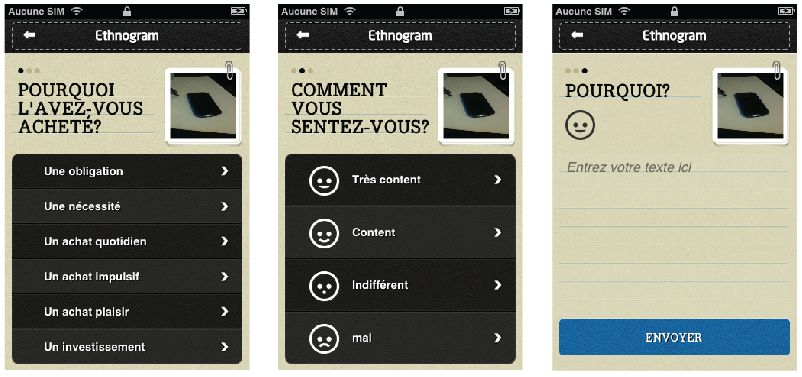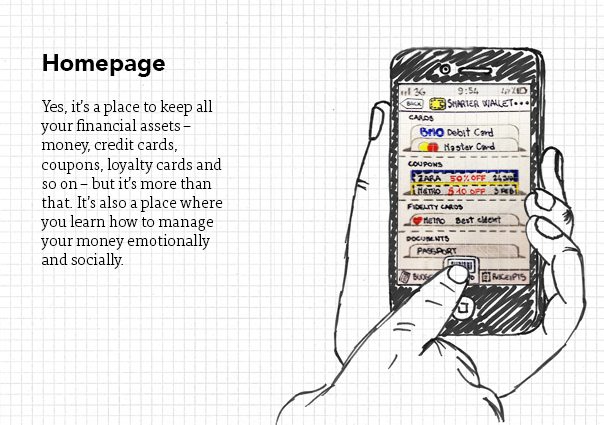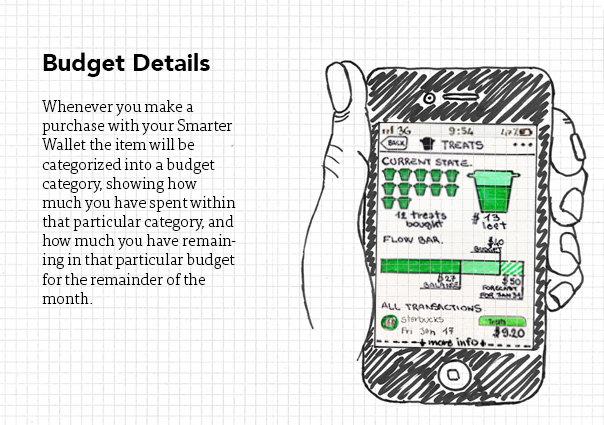Bringing Emotions back into Money Management
As money grows increasingly virtual, there has been a proliferation of new tools to virtually control and manage money. Having this scenario in mind, we undertook an ethnographic study aimed at better understanding how this virtual reality has changed people’s relationship with money. We recruited participants in Montreal, Madrid and Paris to participate in this study in an effort to generate not only local, but also multicultural insights that led us to a user-driven prototyping phase.

Recruitment, participant homework and in-depth interviews
For the purpose of the study we recruited 21 participants in Montreal, Madrid and Spain spanning a wide range of ages, backgrounds and familiarity with money management. Each participant was provided with a digital (and physical) journal and asked to track his/her daily spending and saving for a period of 14 days.
The participant homework has a double role:
- To trigger participants to reflect on how they really behave and which emotions are linked to money spending,
- and to use as a starting point during the in-depth interview.
Once the homework period was over, an anthropologist from our team spent a day with each participant, talking about and observing his/her relationship to money in everyday life.

LEFT: Physical version of the homework diary.
RIGHT: A picture from the fieldwork.
RIGHT: A picture from the fieldwork.

Digital version of the homework diary using the Ethnogram application (internally developed) to track participants’ news consumption.
Analysis and fieldwork insights
Each ethnographic field experience led to a detailed report, all of which were analyzed by our anthropologists to create participant portraits. These portraits included a close look at daily details as well as the emotions behind big / small money transactions and allowed the whole team to get a better understanding of the participants.
Together we brainstormed on the fieldwork material identifying emerging patterns and behaviors that led us to the definition of some key insights.

Cultural experience model
Using our backgrounds as anthropologists, planners, designers, and technical experts we looked at the insights generated by the background research and the field data and saw a story emerging that could explain people’s changing relationship to money given its virtualization. In particular, we noticed that consumers feel pressured into being as rational as possible and denying the emotional side of small everyday financial decisions. But with banks traditionally being in charge of the rational side of things, no one is left to attend to the emotion that comes with spending and saving. We realized that what people really needed were tools that would help them address this imbalance between emtions and rational thinking.

The Smarter Wallet
To bring our findings to life, we organized a workshop involving different experts (anthropologists, UX designers, IT experts, etc.) to brainstorm ideas for further development. We took one concept in particular, the Smarter Wallet, to the stage of paper prototype. The Smarter Wallet addresses the research insights by giving consumers the ability to not only manage money, but to become aware of and manage their emotions around money as well. It also addresses the feeling of loneliness by bringing back the notion that our banking habits are social, allowing the wallet to be shared by family, friends, and communities, and in the process to become a tool that teaches and binds us together.





This project has been developed at Nurun in collaboration with Jean-Pascal Mathieu, Tracy Johnson, Cécile Eymard, Chloé Roubert and various experts from the Madrid and Paris offices. All information herein is proprietary and may not be communicated in part or in whole without prior written consent of Nurun.
